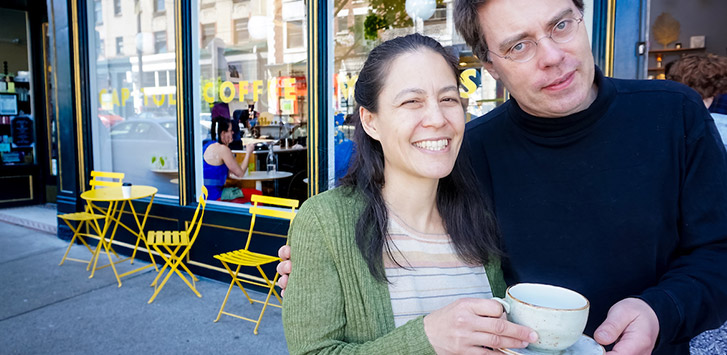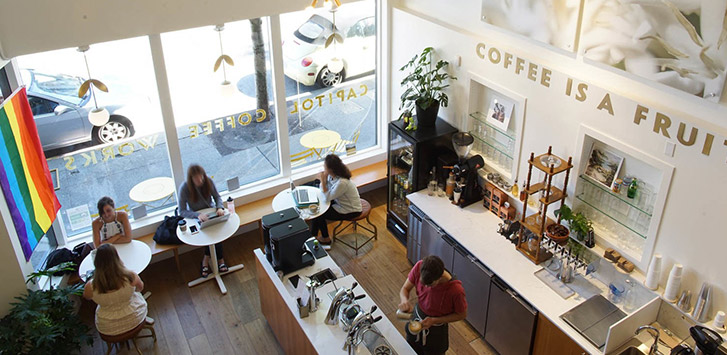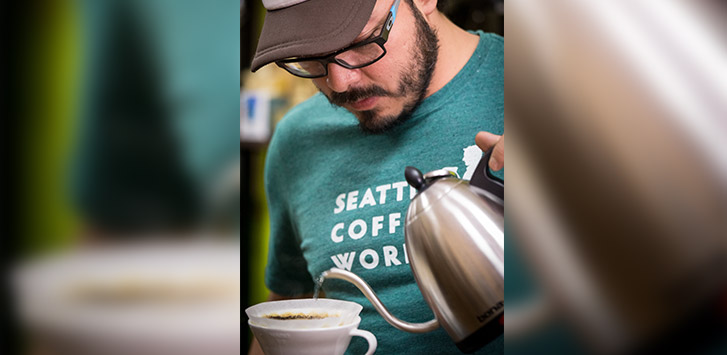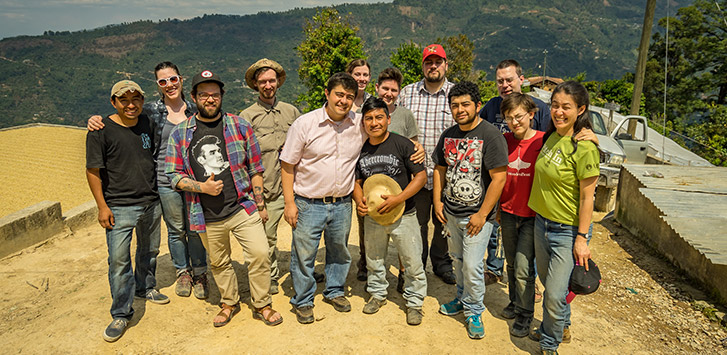
Frequently mentioned as one of the best cafes in Seattle, Seattle Coffee Works is the brainchild of Sebastian Simsch, Pipo Bui, and Oscar Garcia who, over the course of more than a decade, has been slowly and quietly roasting some of the city’s best coffee.
Their unpretentious nature has grown the business to include four cafés, a roastery, bakery, and online business in a city “steeped” in coffee and world-famous for Starbucks and Pike Place Market. Their dedication to providing exquisite coffee that is sourced through direct trade along the guiding principles of “Quality, Equity, Sustainability, and Transparency” is inspiring and aspirational in our globalized world market.

Especially now, as the global pandemic has radically impacted the coffee industry as a whole; from small farmers to consumers, it’s especially crucial to highlight those roasteries, cafés, baristas, and coffee shops continuing to “carry the fire” as the world continues to adapt in the face of COVID.
We were lucky enough to be able to chat with Pipo Bui and get to know more about their cafés, their work with coffee farms in East Africa and Latin America, their trademark Slow Bar, and their commitment to environmental and societal justice within the coffee industry.
CBC: Tell us a bit about yourself and how you fell in love with coffee?
PB: I spent my really, young years in the main coffee-growing region of Vietnam, in what is now called Buon Me Thuot. One of my earliest sensory memories is eating a ripe coffee cherry. I did not actually like coffee until about 2012, when my husband and partner started traveling to coffee farms and importing green coffee directly from truly outstanding coffee farmers. It was such an obvious difference in quality from anything I had tasted before.
CBC: What got you interested in starting the café, roasting house, bakery and beyond?
PB: There were some early aha moments. For example, we went to a cupping with our friend and roaster Neil Brown. He put some East African coffees on the table and warned us there would be a strong taste of blueberries. That was my first cupping and I was imagining I would have to try hard to discover that flavor, but no, it was breathtakingly obvious! It hit me over the head.
That was the first time I understood that coffee could taste like a fruit, rather than like sweet charcoal. This was an intriguing idea and the start of a journey that led us to create first a multi-roaster pop-up, then four cafes, a roastery, and eventually our direct trade green coffee buying program, which is what Seattle Coffee Works is known for today.
CBC: What is your “favorite” part of coffee culture?
PB: The people. Obviously, we all put a ton of work into creating the best possible cup of coffee, and I've had some unforgettable experiences with really well-made coffees. (As a coffee professional, if you have never had an orgasm from drinking coffee, you are probably drinking the wrong coffee.)
But when you get right down to it, we could offer cups of hot water. As long as people get together to spend time and talk with each other, it doesn't really matter what's in the cup or where you are sitting. I have had fantastic conversations with people sitting on the side of the road.
CBC: Obviously being home-base for Starbucks is a pretty good indication, but how is the coffee culture in Seattle? Is it tougher or is it more community-oriented where everyone kind of helps everyone else out?
PB: I think we have a really fun coffee culture here in Seattle. We have a huge customer base of people who enjoy really good coffee and don't mind paying for it. It is not uncommon for perfectly normal people to go out for coffee four times a day! Many meetings and dates take place over coffee. Plenty of people started out drinking Starbucks and are now interested in trying new, more distinctive coffees too.
As for our peer coffee professionals, there are so many wonderful people in every part of the field right here - from inventors of espresso machines to specialists in storing green coffee. I wish we could see each other more, we are all aware of each other and help out whenever needed, it's just that most of us are busy all the time. It is a rapidly growing city with a burgeoning economy, and I guess that's a good problem to have.
CBC: What do you think sets Seattle Coffee Works apart from other cafes?
We are super specialized in direct trade green coffee buying, and our retail cafes are a place to experience the fruits of that effort. Our Slow Bar is a place where customers who have a half hour or so can spend some time asking questions and trying out different coffees and manual brew methods that they might not otherwise dare to try. So, what sets us apart is the quality and varieties of coffee and the opportunity for customers to really delve into them before they buy our beans.

The idea behind the Slow Bar was to have a place for people who want to explore coffee more deeply. It's the opposite of the espresso line - which tends to be fast-paced with a lot of to-go orders and relatively little time to interact with the barista about the coffee.
Other coffee companies also created Slow Bars and Brew Bars, but in the reality of our industry, many of these became just a place to do manual brews. Once I heard someone order a "pour-over to-go." That was a conundrum for the barista... The customer obviously wasn't interested in lingering and talking or learning about the coffee.
In my opinion, they might as well drink drip if they are in a rush. Chemex in a paper cup just seems like a waste, and frankly, indicative of what was wrong with our sped-up culture before covid.
It's not just about the brown liquid in the cup. It is about connecting with people. There's ritual and ceremony. So much of our US coffee culture obliterates that aspect. The Slow Bar is our attempt to reintroduce it.
From the other side of the bar, what sets us apart is our profound commitment to our team - we implemented a no-tips policy to ensure fairness and approach a living, professional wage. And we committed to training and extraordinary educational opportunities such as our annual trip to coffee farms in Guatemala. I think so far 20 of our team members have gone on that trip, and for many of them it was not only their first-time seeing coffee plants in person, it was their first time out of the country!
CBC: What is the most exhilarating part of operating Seattle Coffee Works?
PB: Cupping with our team, and sometimes with our coffee farmers or customers who are jazzed to experience their own and others' coffees in a whole new way. I guess that goes back to the initial cupping with Neil Brown - sharing that aha experience with others is fantastic!
CBC: What is the most challenging part of operating Seattle Coffee Works?
PB: Equipment failures. So many people are constantly working on this - how to make the roasting more efficient, how to keep grinders from clogging and overheating, making refrigerators and dishwashers and HVAC more reliable. These are real headaches for operators and the repair and maintenance expenses are a huge drag on finances and over time, on our time and patience too. We started using a relatively inexpensive software, Upkeep, to at least track of these maintenance tasks and costs.
CBC: What was the impetus behind sourcing exclusively from environmentally and socially conscious growers?
PB: Quality. Equity. Sustainability and Transparency, in that order. We knew that people who treat their plants and their people well would probably be able to get really high-quality coffee beans to us consistently over time. Equity and transparency are important to us personally on an ethical level, and they are also good for business. We think all businesses should operate like this - it's just logical.

CBC: How have you (and Seattle Coffee Works) adapted to COVID?
PB: We pivoted to supplying fresh-roasted coffee by mail. This spring we went from 30 online orders per week to more than 400, so we had to streamline and upgrade our mail order operations. It feels a little like Santa's Workshop in our roastery these days.
What I mean by that is ordering coffee beans for home brewing. (We do not do online espresso drink ordering - it's too expensive and drives down quality.)
Our local public health agency still recommends that staying home is the safest thing to do right now. We are very supportive of that and are doing everything we can to make it easy for people to order coffee beans online, receive them in the mail, and brew coffee successfully at home. It is simply the best and smartest way to enjoy coffee right now.
We post weekly brew tips on Instagram that are geared toward people who do not have lots of fancy being equipment. It is all about how you can get the best out of what you've got. We offer bespoke grinding for those who do not have a grinder at home, and simple, inexpensive brewing equipment. Our head roaster personally answers customers' questions about brewing, often in-depth.
We are not fans of social media - we have long preferred in-person interactions - but we have invested more time into communicating on those platforms recently since we know we cannot see our customers as much now.
Our cafes are open, and we believe we are operating them as safely as possible, but the truth is, no one really knows how to stop infections in places like cafes. So, we assume most people will visit occasionally for a treat - and do most of their coffee consumption at home.
CBC: How do you think the coffee industry will change post-COVID?
PB: I think everyone in the industry will be more hesitant about brick and mortar cafes. Drive-throughs and mail order coffee, online ordering, and cashless transactions have all made huge strides in such a short time. I do not know when people will feel comfortable cozying up to a Slow Bar with only 18" distance between the participants. Cupping protocols will probably change. Maybe there will be a COVID vaccine at some point, but now we know that viruses like this could become more common in the future, so I'm definitely hanging on to my favorite masks.
CBC: What is your favorite coffee bean and why?
PB: I'm really into the heirloom and wilder varieties because they generally are most sustainable, resistant to pests and so on. Of course it's fun to try geshas grown in Panama, SL28 and other newer varieties, Pacamara and so on, but as someone who's concerned about the environment, I do believe it's important to learn to love the coffees that are most likely to survive into the future.
CBC: How do you prepare your personal cup of coffee?
PB: Clever. It's simple, easy to clean, makes a nice cup. I do appreciate espresso but I don't make it at home. It's so much better on a commercial machine, and then I get to see someone. That social interaction is part of the espresso experience.
Conclusion
While COVID has certainly impacted the coffee industry, forcing many to shift towards online transactions and social media, Seattle Coffee Works has married the two and continues to forge a path that is dedicated to ethically sourced direct trade and cultivating a slower, more personal connection to not only its cafes but to the coffee culture at large while being cognizant of the larger societal trends at play. Like any café, Seattle Coffee Works proves that even when the circumstances are not ideal, you can remain firm in your commitments while still adapting, even in a city renowned for its love of coffee like Seattle.